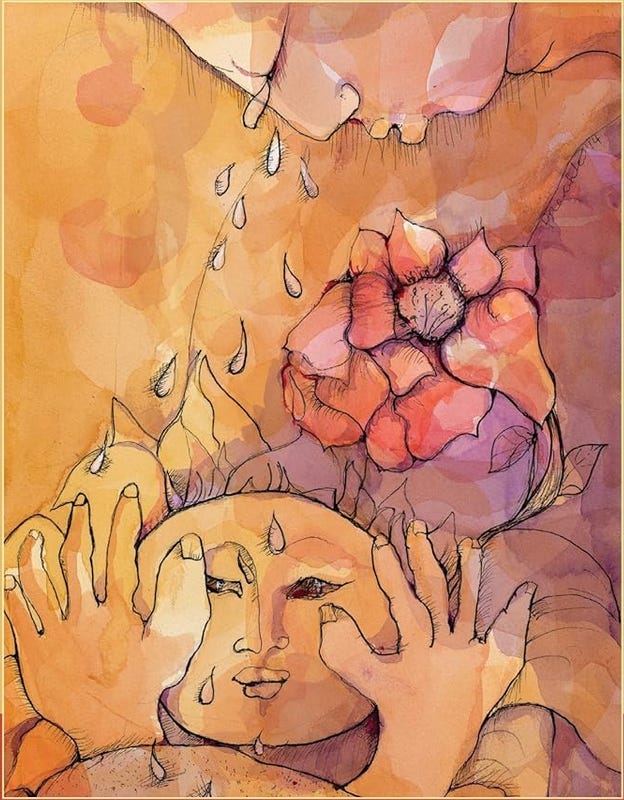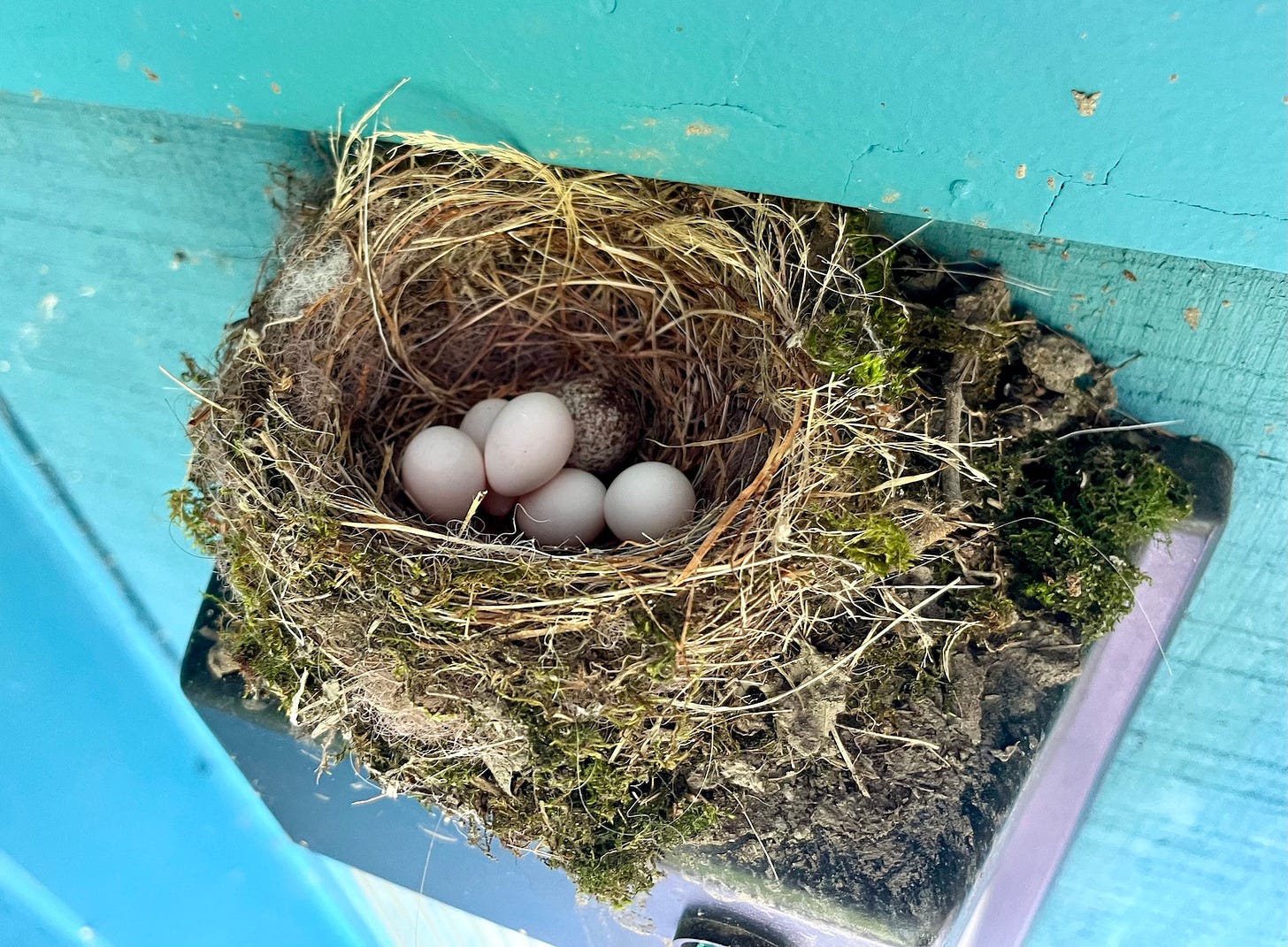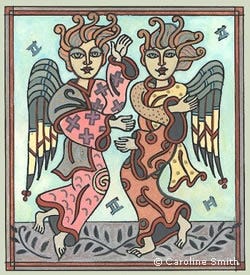The Ascent
Longer days are ahead. And then what?
What is a blossom anyway
but a fist saying I can’t
do this
anymore
—Joseph Fasano
My dear friends and readers,
I hope you are absorbing the warming spring sunshine. It's nice to sync with this seasonal emergence after months of stepping back to witness our world and navigate some personal inquiries during the winter. I have winter’s writings to share. In the meantime, over the last several days I have been re-metabolizing the material where I last left off (while we’ve all continued to live the subject matter daily), only now in the context of spring’s illuminations. Perhaps this is loosely a part two contemplation on light and dark amidst the cries of the world. You’ll tell me.
~~~
The towering white oaks have finally unfurled their leaves as lodging to the migratory hummingbirds who are settled here for now. I catch glimpses of baby bunnies in mid-air as they boing through the tall grass that I mow as infrequently as possible. Up on the porch, an eastern phoebe has nested masterfully; she’s expecting six kids! Spring is joyous in that way, buoyant, gestational, alive. My heart bursts every morning with beloved appreciation when I open my door to the unconditional generosity of this world.
We're in the light half of the year and, for one more month, still gaining daylight. I like thinking about the seasons and the zodiac as archetypal expressions of the exchange between dark and light, yin and yang. I am less interested in modern astrology as cosmic fortune telling and psychological profiling than I am in what it was to the Hellenistic ancients: a contemplation on the eternal, celestial patterns that underlie our earthbound existence — a moving meditation.
I find this late-spring, yang time of Gemini interesting because in its gracious, green abundance it is also preparing us for a shift: at Gemini's end is the peak of light in the northern hemisphere (the summer solstice, the longest day of the year) and the beginning of the slow return of darkness during the second half of the year. In this way, we might say that Gemini’s final, daring act is to confront demise. For growth and expansion are unsustainable without contraction and decay. Double-bodied (also known as mutable) signs mark the times of transition from one season to the next, giving us two natures, duality. Gemini is ascent while it ushers in descent; it is creation as it midwifes destruction and disintegration. Gemini is rational and playful deception, reasonable and inventive argumentation.
It is trickster’s dance. And I can think of no better invitation into an honest relationship with the simultaneous blessings and sorrows of this time than the provocative dynamism and unresolvable ambiguities of the trickster. Where Gemini is concerned, chaos is not the enemy and, refreshingly, consensus is not the goal.
In the inimitable words of Nigerian postactivist philosopher Bayo Akomolafe:
“Tricksters are stewards of queer hope, coaxing us away from safe grounds to the monstrous ambiguities of being more fully present. The disturbing mist in the way. The comedic is not merely about laughter, it’s about accounting for the awkward. Acknowledging limitations.
Thwarting the tried and true. Perverting the obvious. So, when things start to get irresistibly funny; when what was once serious and absolutely certain becomes a caricature of itself; when what feels true is spoken from the mouths of jesters and ‘lies’ becloud the wisdom of the wise; when the sentences of the normal start to sound like gibberish; when the righteous spear tips of fundamentalism become the blood-stained claws of unbridled hate; when differences become weaponized territories; when nuance is sacrificed at the guillotine of political convenience; and, when ‘reason’ itself bends over backwards to touch his own private parts, look for cracks in the pillars. Look for the trickster: run to the safety of trouble. A happy chuckle precedes the lightening bolt that kindles the fire – for those whom the gods wish to kill, they first make mad – with ecstasy.” [emphasis mine]1
I'm pointing us again and again, as is my Gemini nature to do, towards the paradoxical truths of life, of ourselves. “Our contradictions are outnumbered only by the justifications we conjure for them,” I wrote in December about our human tendency toward “othering.” But it bears repeating, to myself as much as to us all, in a world of relentlessly hostile binary forces that enable grotesque perpetrations of violence and oppression.
Renowned Buddhist teacher Tara Brach offers earnest and straightforward reflections on our hurting world in a recent blog post (like mine, hers is also on “othering” and compassion in the context of Israel and Palestine), noting, “Throughout human history, the demonizing of others has been the psychological fuel that drives warfare.”2 I would argue that it has shaped human history, this “supremacist mindset” of biological and/or moral superiority “that casts the extinguishments of entire peoples and cultures not merely as an unavoidable element of the march of progress but also as a salutary stage in the evolution of the human species,” as Naomi Klein names it in her latest book, Doppelganger.3 In the book, she skillfully traces how the irrational becomes rationalized as colonialist history repeats itself over time, one door leading to another in a kaleidoscope of destruction, from Africa to the Americas to Europe to the climate crisis and beyond. (I recommend reading these two excerpted chapters made available for free by the publisher. And here you can watch a fantastic talk she gave last month, drawn from the same material.)
The psychoanalytic and feminist scholar Jacqueline Rose describes it as being “up against the psychic dimension of politics, the place in the mind where disavowal, the splitting of good and evil, the projection of unconscious guilt deep inside the enemy, first nurture themselves and then bear their bitter fruit.” Moreover, she says, ignoring this reality will not make it disappear: “You cannot dream the unconscious away.”4
Many of us can see the bigger picture by now. In Klein’s words, “The mass graves that exist on every continent have flown open and the ghosts have begun to tell their tales.”5 We nod in self-evident agreement and feel comfortable recognizing the “past.” Maybe we do a land acknowledgment. And then, bludgeoned by another headline and too weary for nuance in the face of impending societal, economic, and ecological collapse, we curl into the conclusions prepackaged for us by our side (the right side, obviously), eager for any answer that might explain this madness.
So, rather than viewing these disturbing historical events as unprecedented aberrations dotted throughout history, we might admit that they are, in fact, alarmingly ordinary, predictable, inherited. As are the inexplicable ways humans have always managed to turn away in the face of unspeakable horrors. We needn’t reference genocides to demonstrate this, when 15 minutes on the streets of NYC would confirm that most people cannot even gaze upon an unhoused person. One of my favorite organizations working towards educating the public about homelessness, aptly named Invisible People, has described the unhoused experience as that of a “ghost,” saying that “their words fall on deaf ears. They’re ignored, dehumanized, and invisible.”6
It shouldn’t surprise us, for “one of the hardest habits of thought to shake is the reflex to look away, to not see what is in front of us, and to not know what we know,” Klein cautions, before offering an even more potent inquiry: “We must now ask this: What if full-blown fascism is not the monster at the door, but the monster inside the house, the monster inside us—even we whose ancestors have been victims of genocide?”7

Inconveniently, Gemini does not stop its curious interrogation at our weariness nor our insistence upon our righteousness. Instead, Gemini invites us to consider that our grasp is always fleeting, that we have absolutely nothing figured out. And as we press on, we shall be forced to confront the destructive civilizing machinery of which we are necessarily a part. We shall be forced to reckon with the fact that our comfortable modern world was constructed upon the bones of the damned “other,” and that even our notions of safety, truth, and justice are entitled fabrications of the war machine world — the world we inherited, the only world we have ever known. So we yearn for peace, yet who now among us does not contribute to some of the very things we might condemn, if only in a small way? Can we peer in at that? Can we implicate ourselves and “run to the safety of trouble”?
For victory is not the liberative prize we have been promised, when “the algorithms of peace have never been calculated by or premised on who has the right answer,” said Akomolafe, writing 11 days after the events of October 7, 2023 in a plea against correctness:
“We need a politics of tenderness now more than ever. Not tenderness as capitulation to particular conclusions that have already been made. Not tenderness as ‘if you don't see the world as I do, there's something wrong with you.’ But tenderness as the nurturing of grace that allows something different, something even beautiful, to be born in the midst of the fires.”8
It is clear that we also need new cartographies of soul for encountering such profound devastation and loss, for finding and meeting our monsters. And it is only when we can abandon this manic proliferation of certainty in our “march of progress” that paths may appear. It is only with grief as our compass that we might be afforded glimpses of a post-war-machine world. “Metabolize your losses with grief and feed the resulting beauty to life, or you will become an insatiably hungry monster that devours everything and everyone you touch,” writes Martín Prechtel, author and spiritual teacher trained in the Tzutujil Maya shamanic tradition.9
For grief, like the trickster, is the wild, untamed beast that refuses to conform to the erect postures of progress and productivity; it brings us to our knees, to the ground. Grief is chaos. It is the necessary breaking, it cannot be “fixed,” but must be honored just as it is. Grief is the raw, uncontainable wail of the heart that can soften it’s hardest places, a gateway to compassion. In this way, grief is the opposite of “othering,” rather it is entanglement and intimacy with the world. Like spring, grief bursts with aliveness. It is vulnerability, willingness, and a deep listening that cuts through the impersonal and transactional. Grief knows no enemies, only love. It is a courageous offering to life, an acknowledgement of the dualities embedded in existence.
Prechtel has said that all war is unmetabolized grief. Upon that, in war, we stack more human suffering, generating more grief. Can we meet in the commons of the soul to share our sorrows without ideology so that we may act with discernment and not hatred? If only we could collectively fall to our knees in tender and humble grief, for I believe it is the vulnerability of a broken heart that can truly know what it is to choose to love. Not conceptually, but enacted through an honest assessment of our choices and behaviors, through accountability and acknowledgement of our own dualities… and our own eventual demise.
Once, many years ago, a therapist I saw for a brief time told me, “Love is sacrifice.” Some may balk, but I find it so honorable and think of it often. For we are entrenched in systems (of “civilized” comfort) that we must begin to dismantle, one personal sacrifice at a time, if we are ever to mature and walk with dignity amidst every other species of our global community. Love asks not for what we are owed, but for our generosity, our offerings.
And I wonder, what might we leave on the communal altar of love? What might we cast overboard — from possessions to ideologies — to keep humanity's boat afloat?
Now, in the abundant daylight, may we surrender to the dance of the trickster.
Akomolafe, Bayo. “The rise of tricksters.” Bayo Akomolafe Blog, 10 February 2016. https://www.bayoakomolafe.net/post/the-rise-of-tricksters
Brach, Tara. “What is Love Asking from Us? Reflections on Gaza and the Bodhisattva Path.” Tara Brach Blog, 11 May 2024. https://www.tarabrach.com/blog-reflections-gaza-bodhisattva-path/
Klein, Naomi. “Israel, Palestine, and the Doppelganger Effect.” https://naomiklein.org/wp-content/uploads/2023/12/Israel-Palestine-and-the-Doppelganger-Effect.pdf
Rose, Jacqueline. (November 2023). “You made me do it.” London Review of Books, Volume 45 (Issue 23). https://www.lrb.co.uk/the-paper/v45/n23/jacqueline-rose/you-made-me-do-it
Klein, Naomi. “Israel, Palestine, and the Doppelganger Effect.” YouTube, uploaded by Aydelotte Foundation, 10 May 2024.
Robbins, Kayla. “Making eye contact with homeless people is important.” Invisible People, 22 May 2019. https://invisiblepeople.tv/making-eye-contact-with-homeless-people-is-important/
Klein, Naomi. “Israel, Palestine, and the Doppelganger Effect.” https://naomiklein.org/wp-content/uploads/2023/12/Israel-Palestine-and-the-Doppelganger-Effect.pdf
Akomolafe, Bayo. “When the world becomes solid.” Bayo Akomolafe Blog, 18 October 2023. https://www.bayoakomolafe.net/post/when-the-world-becomes-solid
Prechtel, Martín. Rescuing the Light. North Atlantic Books, 2021, p124.




Beautiful thoughts, necessary insight for our broken world, expressed with the kind of balanced beauty and grace that can help heal eras of divisiveness. Thank you ❤️